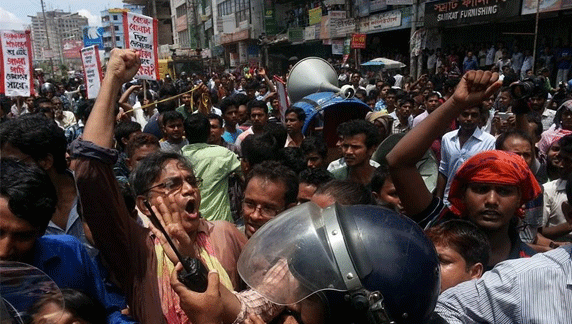Bangladesh murderer steals workers’ wages

Liz Ross, whose article ‘Defying the stereotypes: women textile workers in Bangladesh’ appears in the latest Marxist Left Review, reports on the Tuba Group workers’ struggle for justice.
----------
“Murderer Delwar”: a fitting title for a boss responsible for the fiery deaths of 124 workers in November 2012 at the Tazreen Factory in Dhaka, Bangladesh.
But Delwar Hossain has only recently picked up this nickname, from another group of workers – the 1500 who work in his remaining Tuba Group factories.
Since February, Hossain has been held in custody on homicide charges related to the Tazreen fire. In April, he stopped paying his workers’ wages, claiming he couldn’t pay while in jail. It was a calculated manoeuvre to secure his release on bail. Having already stolen the lives of dozens, this man leveraged the lives of hundreds more to gain his freedom. Delwar’s factories have been operating since his imprisonment. Tuba Group made about $260 million worth of clothing for the recent World Cup and exported $390 million of goods in the first half of 2014. Workers are owed just $4 million.
In desperation, after months of broken promises and without pay since the beginning of May, several hundred workers began a hunger strike on 28 July. They are occupying their factories, many homeless and already hungry, having no wages to pay rent or buy food.
Now Delwar has been granted bail. But there are still no payments for workers. As part of a call for solidarity, one writer outlined the injustice unfolding: “While one injured worker of Tazreen Fashions, Amena Begum, is counting her last days at a palliative care centre, missing workers families still awaiting proper compensation and 1500 workers starving for three months without pay, the owner is granted bail.”
The main textile industry employers’ group, BGMEA, has been part of the crooked dealings all along, even forming part of the negotiating group signing empty promises to pay the workers’ wages in June and July. Now it’s saying the company doesn’t have enough money, the government should pay, and that maybe the workers will be paid soon!
Support groups, left-wing unions and some of the workers have been protesting outside the courts, BGMEA headquarters, the Ministry of Labour and Tuba Group factories. They’ve been met by water cannons, tear gas, police brutality and eventually promises, but no money.
Across the world in Greece, two farmers have walked free after shooting and maiming 28 Bangladeshi strawberry pickers who “dared’ to ask for six months’ wages owing. (Two more farmers were jailed for assault and possessing firearms, but were set free pending appeal.)
“What do these stories tell?”, asks Bangladeshi journalist Farooque Chowdhury. “They tell tales of capital’s character, tales of collaboration that capital crafts, tales of justice that capital delivers, and they tell tales of the state that capital commands.”
In other words, they’re tales of capitalism itself – a system based on exploitation, on the pursuit of profit above human need and of brutal force used to make sure the wheels of industry keep turning.
It is a story of a system that maintains the rule of an obscenely wealthy minority (the infamous 1 percent) over an impoverished majority, while fomenting war and environmental disaster to keep their system going.
From the 1800s industrial revolution to today, one of the industries whose history illustrates starkly the depravities of capitalism is textiles. Most recently in Bangladesh, it has played a particularly destructive role for workers, while creating a wealthy and politically influential band of employers.The story doesn’t end there. Bangladeshi workers also tell a tale of resistance. As Karl Marx observed, capitalism creates its own gravediggers – the working class. Simple resistance, however, is not enough. Workers need to organise, form trade unions and build their collective strength.
In Bangladesh there have been inspiring examples of just that in the aftermath of such atrocities as the Tazreen fires and the Rana Plaza collapse.
While workers’ action and the widespread outrage that followed these cases of criminal negligence forced the textile bosses and retail chains to promise compensation and improved safety, the bitter experience of the Tuba workers shows that promises are worthless without the constant vigilance of workers and their unions.
It is now, only in the face of renewed workers’ action – and growing solidarity (including internationally) – that the employers are starting to take heed again.
------------
There is a Melbourne rally in solidarity with Tuba Group workers – Friday 8 August, Federation Square (outside SBS Television) at 12:30pm.